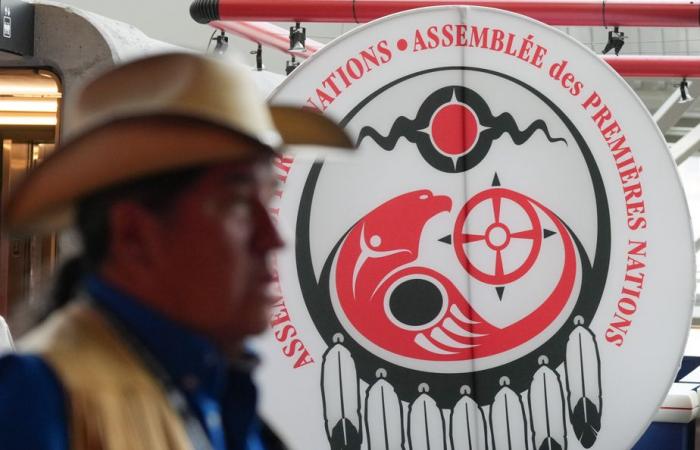(Ottawa) First Nations chiefs have voted against a historic $47.8 billion agreement on child welfare reform, reached in July with the Canadian government.
Posted at 8:28 p.m.
Updated at 9:25 p.m.
Alessia Passafiume
The Canadian Press
At a special chiefs’ assembly in Calgary hosted by the Assembly of First Nations, 267 of 414 chiefs voted against a resolution in favor of the agreement after a lengthy and at times emotional debate as they argued for or against.
Resolutions remain on the agenda for the final day of the meeting Friday, including giving leaders another 90 days to review the deal, which will bring another vote, this time in January.
The agreement was reached between Canada, Ontario chiefs, the Nishnawbe Aski Nation and the Assembly of First Nations after a nearly two-decade legal battle over the federal government’s underfunding of protective services childhood on reserves.
The Canadian Human Rights Tribunal declared the decision discriminatory.
He called on the Government of Canada to reach an agreement with First Nations to reform the system and compensate children who were taken from their families and placed in foster care.
Leaders and service providers have criticized the deal for months, saying it doesn’t go far enough to ensure an end to discrimination, and have blasted the federal government for what they see as its failure to consult First Nations during negotiations.
“Everything is on the table”
Cindy Blackstock, executive director of the First Nations Child and Family Caring Society of Canada, which helped bring forward the initial human rights complaint, said before the vote that chiefs can do better than the agreement that was made and she cannot approve it.
“I want to see a day when we end discrimination and it doesn’t happen again – and we can do it,” Ms.me Blackstock. “Not for long; we have all the tools to get there. »
The national chief of the Assembly of First Nations stressed Wednesday and Thursday that this was not the case, saying a change of government could call into question the reforms, while Mme Blackstock stressed that the reforms are required by a legal order, not by political will.
“I lived through the Harper years, and the Canadian Human Rights Tribunal survived the Harper years,” she recalled, referring to former Conservative Prime Minister Stephen Harper. “Everything is on the table. »
In another speech, Cindy Blackstock lambasted the federal government for what she called a failure in its duty to consult First Nations during negotiations and after the agreement was published.
“Where is Canada?” ”, she asked.
In a statement Wednesday, a spokesperson for the Minister of Indigenous Services said the ministry would not tell First Nations organizations how to mobilize their own members.
The Assembly of First Nations is not a rights-holding organization, but rather a forum where 630 rights-holding leaders across Canada can advocate for their concerns.
The federal government has a duty to consult First Nations when its actions could affect their rights.
“It’s a deal that only happens once”
Carolyn Buffalo, a Montana First Nation mother in Maskwacis, Alberta, was one of the representative plaintiffs in the Jordan’s Principle Families class action lawsuit.
Jordan’s Principle is a legal rule named in honor of Jordan River Anderson, a First Nations child born in 1999 with multiple health problems that kept him in hospital since birth. He did not leave the hospital until he died at the age of five, and governments could not agree on who should pay for his home care.
M’s sonme Buffalo, Noah, has cerebral palsy and requires ongoing care. But Ottawa made that care difficult for him on the reserves.
Speaking through tears at the meeting earlier Thursday, the mother said she thought leaders would vote against the deal she and others have worked on for years. She said the children would be left unprotected if the deal was rejected.
“I didn’t even want to come to this assembly because I knew that, politically, it would be difficult,” she confided. “Do I trust the APN? No. Do I trust the Liberal government? No, but I am in favor of this legal process. This is why we agreed to join and participate in it. If I thought for one second that this was going to harm our people, I would not be a part of this…go ahead and screw up the deal. But if the deal is lost, just remember what I said. »
Another plaintiff, Ashley Bach, was kicked out of her community as a child. She urged leaders to remember that many children in care are watching the assembly, even if the topic is traumatic for them and some conversations have been hostile.
“It’s a deal that only happens once in childhood, because if we wait too long, we’re going to lose another generation,” she explained. “If we wait years and years to reach a perfect agreement, they will no longer be children. They will be like me. »






